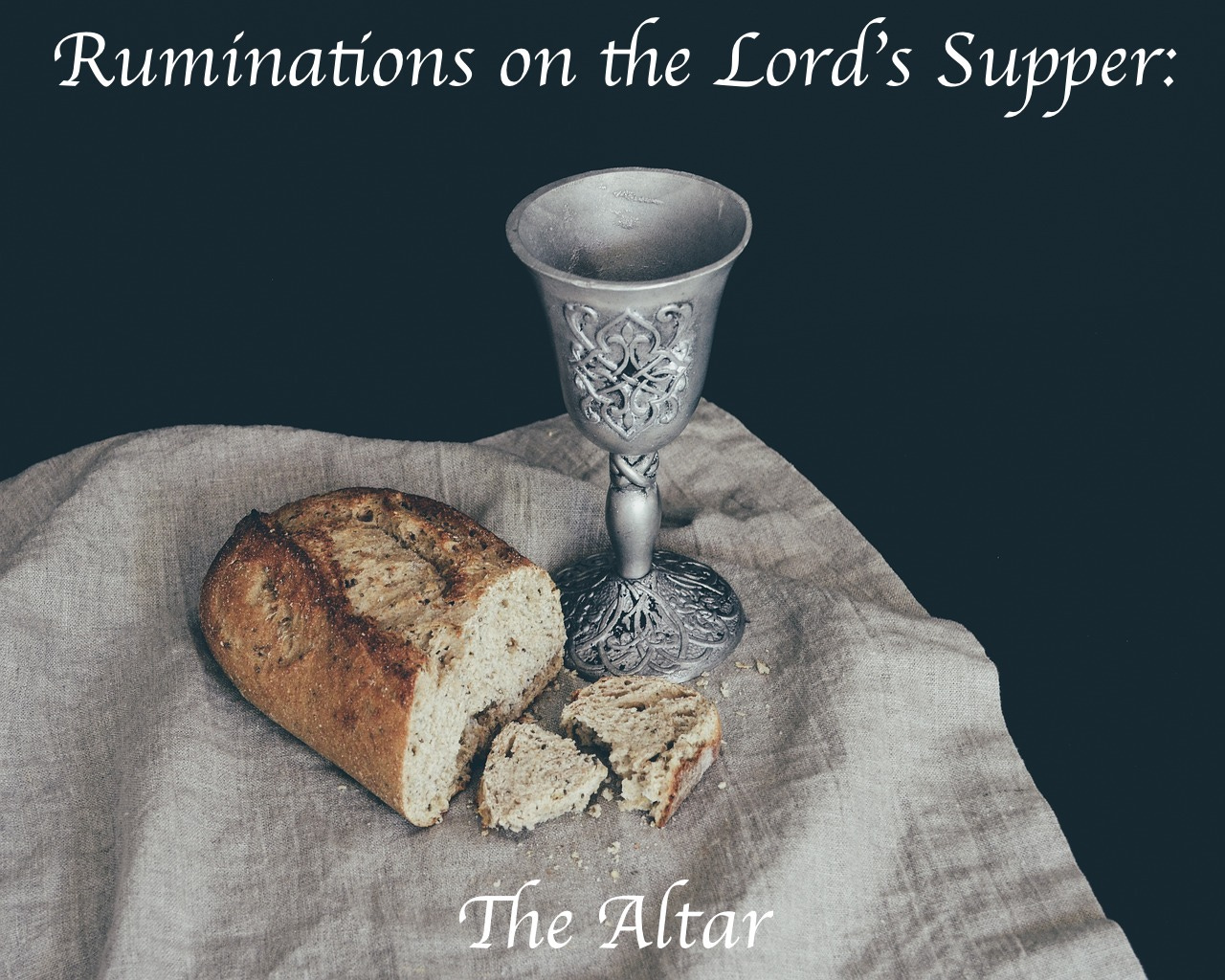Ruminations on the Lord’s Supper: The Altar

Altars dot the biblical landscape. We find them early on in Scripture when Noah disembarks and builds an altar. Abraham moves through the land of promise, establishing altars throughout the land. When the people of God are delivered from Egypt, God makes Mt Sinai one big altar, complete with fire and smoke. As Mt Sinai becomes the sanctuary of God, the Tabernacle (Ps 68:17), it also looks like an altar with the glory cloud above it and in it (cf. Ex 40:34-38). In one sense, the entire Tabernacle is an altar as the fire and smoke of God’s presence fill it. So it was also with the Temple (2Chr 7:1-3). There were specific altars in both the Tabernacle and Temple that provided an exposition of the meaning of these structures from different perspectives. There was an altar of ascension offerings in the courtyard and an altar of incense just outside the veil or the doors that separated the Holy Place from the Holy of Holies.
There must be something significant about altars if God spends so much time in Scripture giving us prescriptions, proscriptions, and images of them everywhere. As we look at and meditate upon what goes on at these altars, we begin to see their importance. Altars are the place where God meets with man. They are places of communion between God and man, heaven and earth. At the altar, the creation that was separated between heaven and earth by a firmament on the second day of creation is united (Gen 1:6-8). This communion is a co-mingling, a union, between God and man that could be seen in the courtyard. Animals, bread, oil, fragrances, and wine were all “consumed” by the altar, and their smoke ascended into the glory cloud of God himself. These offerings were “food offerings” for God. They became a part of him, and he became a part of them. The worshiper represented in the offerings enjoyed communion with God at the altar. The altar was a banquet table from which God and man would eat. Yahweh makes it clear that the altar is table through the prophet Malachi. When answering the question, “How have we despised your name?” Yahweh replies, “By offering polluted food upon my altar. But you say, ‘How have we polluted you?’ By saying that Yahweh’s table may be despised.” (Mal 1:7). The altar is a communion table.
In the Old Covenant, bread and wine were combined in the altar of ascension offerings. God and man would commune through the representative offerings. No man–neither priest nor non-priest–was allowed to drink wine as he drew near in the Tabernacle or Temple. The wine must be poured out upon the offering upon the altar, united with the flesh or bread being burned upon the altar.
There is a marked difference in the New Covenant. On the communion table, bread and wine remain separated. Jesus takes bread, gives thanks, breaks it, and distributes it to his disciples. After they have eaten, he takes the cup of wine, gives thanks, and distributes it. Bread and wine are not combined on this table. But they are combined. The bread and wine are combined in the body of Christ, the church. The church collectively becomes an altar, and each individual member is an altar. In this meal, Jesus is declaring that his disciples are altars, communion tables. On the Day of Pentecost, he will light the fire on his altar just as Yahweh did with the altar fire in the Tabernacle.
Whatever altars were in the Old Covenant worship system, Jesus’ disciples are now. Dear believer, in Christ Jesus, you are the place where heaven and earth are united. You are a citizen of heaven (Phil 3:20) even while walking this earth. You are the promise of God’s future union between heaven and earth realized now in the present. As such, you are to be bringing the shape of heaven to the earth. In heaven, God’s will is done. Our mission as heavenly citizens is to see God’s will done on earth as it is in heaven. That begins with our own lives being shaped by the will of God in word and deed, in attitude and action. What do people know of heavenly life by looking at you?
As an altar, the church and her members are the place where the world communes with God. We are God’s communion table. As the church, we present ourselves as food to God and become food for others. We give up ourselves as living sacrifices, dying so that others might be nourished. In this death, not so surprisingly, we find ourselves resurrected in a transformed life. Only as the church corporately and individually lives this altar-shaped life will we be who we are made to be and fulfill our mission. Only as we live these altar-shaped lives will the world find life.
The post Ruminations on the Lord’s Supper: The Altar appeared first on Kuyperian Commentary.

